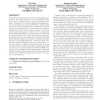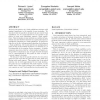5995 search results - page 51 / 1199 » Algorithmic Game Theory |
134
click to vote
MOBIHOC
2012
ACM
13 years 3 months ago
2012
ACM
A key feature of wireless communications is the spatial reuse. However, the spatial aspect is not yet well understood for the purpose of designing efficient spectrum sharing mecha...
CORR
2002
Springer
15 years 1 months ago
2002
Springer
I consider issues in distributed computation that should be of relevance to game theory. In particular, I focus on (a) representing knowledge and uncertainty, (b) dealing with fai...
121
click to vote
JSAC
2007
15 years 1 months ago
2007
— One of the distinctive features in a wireless ad hoc network is lack of any central controller or single point of authority, in which each node/link then makes its own decision...
115
click to vote
SIGECOM
2003
ACM
15 years 6 months ago
2003
ACM
We prove the existence of -Nash equilibrium strategies with support logarithmic in the number of pure strategies. We also show that the payoffs to all players in any (exact) Nash...
GRAPHITE
2003
ACM
15 years 6 months ago
2003
ACM
Much literature has argued that interactive engagement in a computer medium is best demonstrated by games. With this in mind, this paper suggests certain techniques that virtual e...


